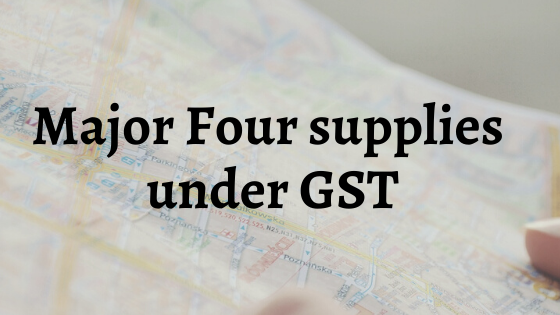It has been 3 years since GST was first introduced in our country but people still face problems and there is a lot of ambiguity among them. The difference between Nil Rated, Zero Rated, Non-taxable, and Exempt supplies is one of them. In this article, we have tried to contrast between the four.
Zero Rated Supply
As per section 16(1) of IGST zero-rated supply is defined as
- The export of goods and services or both to a country, Special Economic Zones or Special Economic Developer comes under zero-rated supply.
- The entire export/supply chain from the inputs to the output is free from GST. There is no such list of Zero Rated Goods provided by the government.
- Zero Rated Supply doesn’t mean that the goods or services attract a 0 GST.
- The input tax credit or a refund can be claimed on Zero Rated Supplies or in other words on the Inputs/ Input Services. Example: If cement is exported at a rate of 28% so you have to pay the whole tax and then can claim a refund on the amount. The refund on the amount can be claimed in two ways-
- Either pay the IGST on the supply of goods and services subject to the rules and regulations and then claim the refund.
- Or supply the goods and services subject to rules and regulations without paying the IGST under Letter of Undertaking (LOU) and then claim the refund.
Note: For obtaining the ITC you have to be registered under GST Registration
Nil Rated Supply
- The goods or services which attract a 0% GST rate fall under this category. Example: Cereals, fruits, salt, etc.
- GST credit is not available on such items as they are the daily and essential items used by human beings to conduct their life.
- Under this category, the tariff is at nil rate.
- The services under Nil Rated Supplies are nowhere defined under GST. However, there is only one service defined under the Nil Rated Supplies i.e. Support Services to Agriculture.
Exempted Supply
- You can refer to section 2(47) of GST law for Exempted Supplies. Any good or service notified under a part of section 11 and section 6 (IGST) that attract a nil rate or are wholly exempted falls in the category of exempted supplies. Example: Live animals except for horses.
- You can take reference from the following notifications for the goods and services that come under Exempted supplies:
- Notification No. 2/2017-Buttermilk, Curd, Pooja Samagri, etc.
- Notification No. 7/2017- Services by CSD (Canteen Stores Department) to any canteen or authorized customers etc.
- Notification No. 8/2017- Supply less than Rs. 5000 from the unregistered dealer. Note: If a person exceeds the above limit then he will be liable to pay GST on the total amount. The above notification is only applicable if the supplies are made under the prescribed limit.
- Notification No. 10/2017- The buying and selling of second-hand goods. Note: If the purchase of second-hand goods is made from an unregistered dealer then only the person will not be liable to pay GST otherwise GST will be liable on the purchase of the second-hand goods from the registered dealer.
- No input tax credit can be availed on Exempted Supplies and in a situation where you are not registered under GST Registration.
Non- Gst Supply
- It is also known as Non-taxable supply which is defined under section 9 of CGST which says that such supplies do not come under GST and may be subject to other taxes like state tax, any local tax, etc.
- According to Schedule III, the following points do not fit in the definition of supply. Only some points are listed below:
- Any services provided by an employer to its employer concerning his employment.
- Services rendered by tribunal courts.
- Sale of land or a building.
- The non-taxable supplies are those on which there is no GST bur maybe it will be applicable in the future. Example: Petroleum Products, Alcohol for Human Consumption, natural gas, etc.
- The input tax credit is not available on Non-taxable supplies
Note: The alcohol doesn’t attract GST only if it is for human consumption. If the alcohol is used by a chemical industry as a raw material or it is being sold for other purposes then it will attract GST. Alcohol is used for business promotions will not attract GST.
